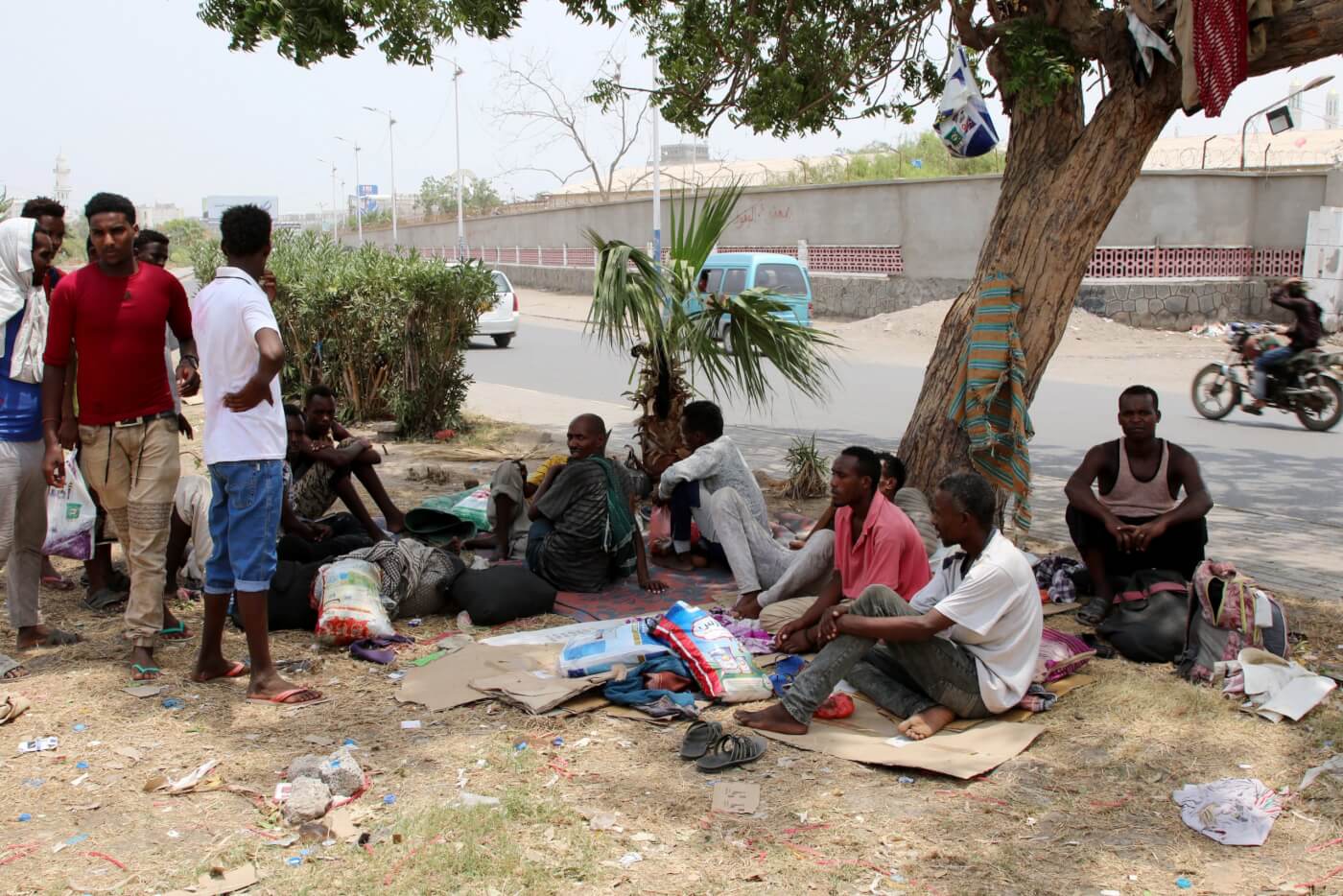On Thursday 13 August, thousands of Yemenis took part in a rally in the south of the country, demanding that the government liberate the Taiz governorate from the Houthi militia and restore security to the city. Meanwhile, according to a new report from Human Rights Watch, Houthi militia forcibly expelled thousands of Ethiopian migrants from northern Yemen, killing dozens and forcing them to the Saudi border.
War-ravaged Yemen is divided between the internationally recognised government temporarily based in the south and the Houthi militia that ousted it from power in the capital, Sana’a, in late 2014. The Houthis are aligned with Iran while the officially recognised government is backed by a Saudi-led military coalition.
Houthi militia expelling migrants
According to a new report from Human Rights Watch, Houthi militia forcibly expelled thousands of Ethiopian migrants from northern Yemen using Covid-19 as a pretext, killing dozens and forcing them to the Saudi border in April 2020. Saudi border guards then fired on the fleeing migrants, killing dozens more, while hundreds of survivors escaped to a mountainous border area.
Ethiopian migrants told HRW that after they spent days stranded without food or water, Saudi officials allowed hundreds to enter the country, but then arbitrarily detained them in unsanitary and abusive facilities without the ability to legally challenge their detention or eventual deportation to Ethiopia. Nadia Hardman, refugee and migrant rights researcher at Human Rights Watch described,
“The lethal disregard Houthi and Saudi forces have shown civilians during Yemen’s armed conflict was replayed in April with Ethiopian migrants at the Yemen-Saudi border,”
said Nadia Hardman, refugee and migrant rights researcher at Human Rights Watch.
“United Nations agencies need to step in to address the immediate threats to the Ethiopian migrants and press for accountability for those responsible for the killings and other abuses.”
Stranded on the Saudi border
Covid-19 has affected the migrants in several ways. From February to June, the number of people making the journey to Yemen dropped by 90%. Over 138,000 migrants arrived in Yemen from the Horn of Africa in 2019, according to the International Organization for Migration (IOM). This year only 1,725 arrivals were registered.
At the same time, border closures have prevented people from reaching Saudi Arabia or returning from Yemen to their home countries largely as a result of Covid-19 movement restrictions.
Unable to continue their journey to Saudi Arabia, at least 14,500 – probably more – are struggling to survive in the cities, according to the IOM. Thousands are said to be stuck near to the Saudi border, where they are hiding in the mountains from security forces, without food or water.
“Most of the stranded migrants are sleeping out in the open or in unsafe abandoned buildings, which puts them at greater risk of exposure to Covid-19. They have little access to basic services like food, clean water or health care – a worrying situation given how rife the virus is in Yemen,” IOM warned.
Migrants stranded in #Yemen talk about the marginalization they’re facing, made worse by the coronavirus pandemic https://t.co/VB1y8dZB3f
— InfoMigrants (@InfoMigrants) August 1, 2020
Why are migrants coming to Yemen?
Even though a civil war has been raging in Yemen for over five years, the country is a transit country for migrants hoping to make it to Saudi Arabia and find work there. Most of these migrants hail from Ethiopia. Migrants from rural areas, such as Oromia, Amhara, and Tigray in Ethiopia account for 92% of migrants of the Horn of Africa, with 90% of them intending to cross from Yemen to Saudi Arabia.
As reported by Mansour Al-Rasmi for The Investigative Journal (TIJ),
“to reach Saudi Arabia they could walk an estimated 860 kilometers on foot. Roughly, only about 10% to 20% of migrants reach Saudi Arabia—the land of opportunity where they usually get jobs according to testimonies from migrants who survived the perilous journey.”
Ethiopian immigrant Saeed Muhammad Musa told TIJ that the
“migration from the Horn of Africa to Saudi Arabia through Yemen as a journey of ‘death’ which only desperate people who have lost hope of earning a living back home would embark on in search of livelihood outside their homeland.”
More than two years ago, Human Rights Watch revealed that hundreds of African migrants and asylum seekers were subjected to arbitrary detention, torture, rape, beatings, and forced deportation in a temporary official detention site.
Mr Al-Rasmi visited several detention centres and reported that:
“It is difficult to obtain clean water or adequate food, nor do these centers have showers or medical staff to take care of the health of those held there. As a result, dozens of migrants died of fever, diarrhea and cholera.”
According to the International Organisation for Migration, as Europe has cracked down on routes over the Mediterranean from Turkey and Libya, the journey to Yemen is now the busiest maritime migration route in the world.
In the past two years, more migrants have traveled by boat to Yemen from the Horn of Africa than crossed the Mediterranean.
Thousands of them are now trapped and facing multiple risks from the ongoing civil war, the threat of Covid-19, and abuse by human traffickers.
As Mr Al-Rasmi concludes:
“Yemen needs assistance to provide care for those displaced by the war and provide them with a life-line. Serious investigations must reveal the crimes and violations against migrants and asylum seekers. Similarly, the smuggling gangs and their collaborators must be prosecuted, and deterrent measures should be taken against them in the concerned countries.”

